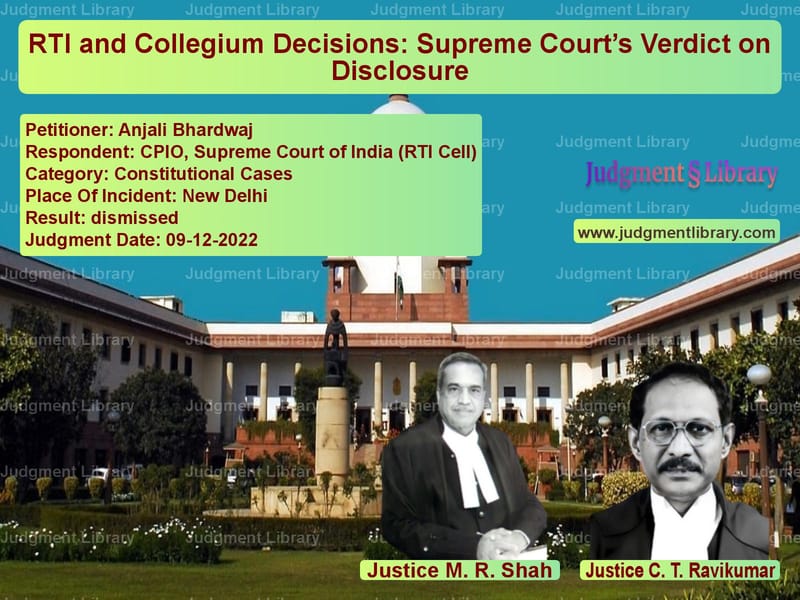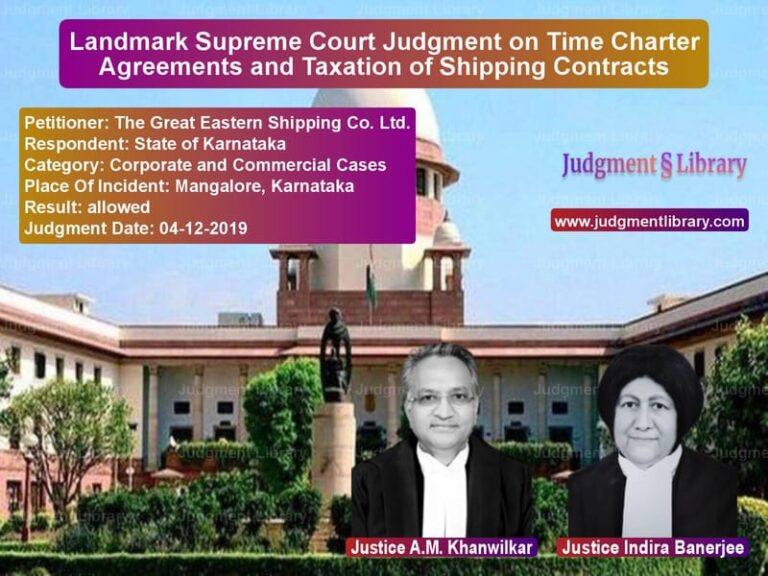RTI and Collegium Decisions: Supreme Court’s Verdict on Disclosure
The case of Anjali Bhardwaj vs. CPIO, Supreme Court of India (RTI Cell) revolves around the petitioner’s request for information regarding the Supreme Court Collegium meeting held on December 12, 2018. The petitioner sought details of the agenda, decisions, and resolutions from the said meeting under the Right to Information (RTI) Act. However, her request was denied at various levels, leading to a legal battle that culminated in this Supreme Court judgment.
The petitioner filed an RTI application seeking:
- A copy of the agenda of the Supreme Court Collegium meeting held on December 12, 2018.
- A copy of the decisions taken during the said meeting.
- A copy of the resolutions of the said meeting.
Her request was rejected by the Central Public Information Officer (CPIO) on March 11, 2019, on the ground that no final decisions were taken in that meeting. Subsequently, her first appeal was dismissed, as the First Appellate Authority ruled that no resolution was drawn due to incomplete consultation. The petitioner’s second appeal and writ petition before the High Court also met with the same fate, leading to the present Special Leave Petition before the Supreme Court.
Read also: https://judgmentlibrary.com/supreme-court-orders-review-of-fake-pharmacists-case-in-bihar/
Arguments by the Petitioner
Represented by senior advocate Prashant Bhushan, the petitioner argued that the Collegium did take certain decisions in the meeting held on December 12, 2018. He contended that the Supreme Court’s own resolution dated October 3, 2017, mandated that decisions of the Collegium must be uploaded on the Court’s website. He further referred to media reports stating that a member of the Collegium had expressed disappointment over the non-disclosure of the decisions taken in that meeting.
Bhushan maintained that the RTI Act guarantees the public’s right to know about the decisions of the Collegium, especially regarding judicial appointments and elevations. He insisted that any decisions taken by the Collegium must be disclosed, irrespective of whether they were later changed in subsequent meetings.
Arguments by the Respondent
The respondent, represented by the CPIO of the Supreme Court, countered that there was no final decision in the Collegium meeting held on December 12, 2018. It was argued that discussions took place, but no resolution was drawn. The respondent relied on the subsequent Collegium resolution dated January 10, 2019, which explicitly stated that while some discussions had occurred in the December 12, 2018 meeting, the required consultation was not completed, and thus, no final decision was made.
Observations by the Supreme Court
The Supreme Court, after considering the submissions, made the following crucial observations:
- The Collegium is a multi-member body, and its decisions are only finalized when a resolution is drawn and signed by its members.
- As per the January 10, 2019 resolution, discussions took place on December 12, 2018, but no final decision was reached.
- Only final resolutions, and not deliberations or discussions, are required to be uploaded on the Supreme Court’s website, as per the resolution dated October 3, 2017.
- The information sought by the petitioner pertained to discussions and not a final resolution, and thus, it was not liable to be disclosed under the RTI Act.
Supreme Court’s Verdict
On these grounds, the Supreme Court dismissed the Special Leave Petition, stating:
“Whatever discussions had taken place in the Collegium meeting on December 12, 2018, cannot be said to be a final decision. Only after completing the due consultative process and passing a resolution can it be considered final and made public.”
The Court further ruled that reliance on media reports and opinions of individual Collegium members cannot override the official resolutions of the Supreme Court.
With this judgment, the Court upheld the confidentiality of internal Collegium discussions while reaffirming the requirement of transparency in final Collegium decisions.
Petitioner Name: Anjali Bhardwaj.Respondent Name: CPIO, Supreme Court of India (RTI Cell).Judgment By: Justice M. R. Shah, Justice C. T. Ravikumar.Place Of Incident: New Delhi.Judgment Date: 09-12-2022.
Don’t miss out on the full details! Download the complete judgment in PDF format below and gain valuable insights instantly!
Download Judgment: anjali-bhardwaj-vs-cpio,-supreme-court-supreme-court-of-india-judgment-dated-09-12-2022.pdf
Directly Download Judgment: Directly download this Judgment
See all petitions in Fundamental Rights
See all petitions in Constitution Interpretation
See all petitions in Public Interest Litigation
See all petitions in Judgment by Mukeshkumar Rasikbhai Shah
See all petitions in Judgment by C.T. Ravikumar
See all petitions in dismissed
See all petitions in supreme court of India judgments December 2022
See all petitions in 2022 judgments
See all posts in Constitutional Cases Category
See all allowed petitions in Constitutional Cases Category
See all Dismissed petitions in Constitutional Cases Category
See all partially allowed petitions in Constitutional Cases Category







